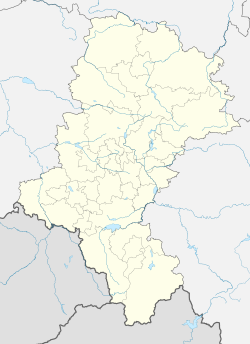Wisła Mała
Wisła Mała | |
|---|---|
Village | |
 Saint James church | |
 Coat of arms | |
 Location of Wisła Mała within Gmina Pszczyna | |
 Wisła Mała Location of Wisła Mała within Gmina Pszczyna | |
| Coordinates: 49°57′N 18°48′E / 49.950°N 18.800°ECoordinates: 49°57′N 18°48′E / 49.950°N 18.800°E | |
| Country | |
| Voivodeship | Silesian |
| County | Pszczyna |
| Gmina | Pszczyna |
| First mentioned | 1233 |
| Population | 1,295 |
| Time zone | UTC+1 (CET) |
| • Summer (DST) | UTC+2 (CEST) |
| Vehicle registration | SPS |
| Voivodeship roads | |
Wisła Mała (Polish: [ˈviswa ˈmawa], "Little Vistula"; German: Deutsch Weichsel, "German Vistula") is a village in the administrative district of Gmina Pszczyna, within Pszczyna County, Silesian Voivodeship, in southern Poland.[1] It lies approximately 12 kilometres (7 mi) west of Pszczyna and 37 km (23 mi) south-west of the regional capital Katowice. The village has a population of 1,295.
History[]
In the Middle Ages, the area was part of the territory of the Vistulans tribe, one of the Polish tribes.[2] It became part of the emerging Polish state in the 10th century. As a result of the fragmentation of Poland, it was part of the Polish Seniorate Province and Duchy of Racibórz. The village of Wisła was first mentioned in 1223 as Vizla, in a document of Bishop of Wrocław issued for Norbertine Sisters in Rybnik among villages paying them tithe.[3][4] It belonged then to the Duchy of Opole and Racibórz and Castellany of Cieszyn. Later it belonged together with Wisła Wielka to the state country of Pszczyna. The adjective German differentiated it from Wisła Wielka, which most likely referred to it being established according to the so-called German Law as opposed to the old ius ducale (Polish Law).
Transport[]
The Voivodeship road 939 runs through the village and the National road 81 runs nearby, west of the village.
References[]
- ^ "Central Statistical Office (GUS) - TERYT (National Register of Territorial Land Apportionment Journal)" (in Polish). 2008-06-01.
- ^ Orlik, Zygmunt (2012). Poręba: z życia podpszczyńskiej wsi (in Polish). Pszczyna: Towarzystwo Miłośników Ziemi Pszczyńskiej. p. 13. ISBN 978-83-62674-16-9.
- ^ Panic, Idzi (2000). "Z badań nad osadami zanikłymi na Górnym Śląsku w średniowieczu. Uwagi w sprawie istnienia zaginionych wsi podcieszyńskich, Nageuuzi, Suenschizi, suburbium, Radouiza, Zasere, Clechemuje oraz Novosa". Pamiętnik Cieszyński. Polskie Towarzystwo Historyczne Oddział w Cieszynie (15): 29–37. ISSN 0137-558X. Archived from the original on 3 December 2013. Retrieved 7 December 2012.
- ^ Panic, Idzi (2010). Śląsk Cieszyński w średniowieczu (do 1528) [Cieszyn Silesia in Middle Ages (until 1528)] (in Polish). Cieszyn: Starostwo Powiatowe w Cieszynie. p. 294. ISBN 978-83-926929-3-5.
| Wikimedia Commons has media related to Wisła Mała. |
- Villages in Pszczyna County
- Silesian geography stubs

